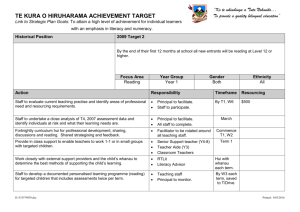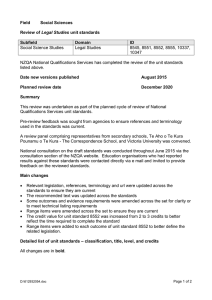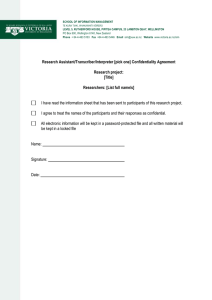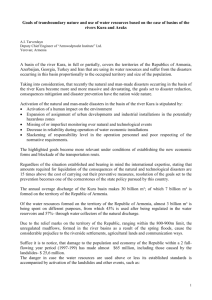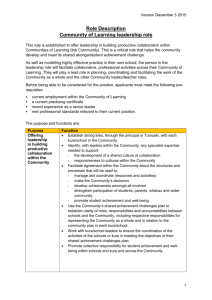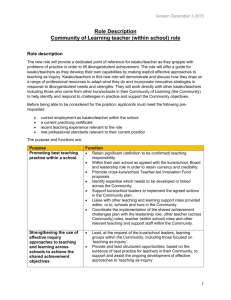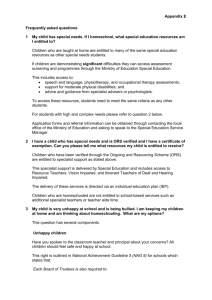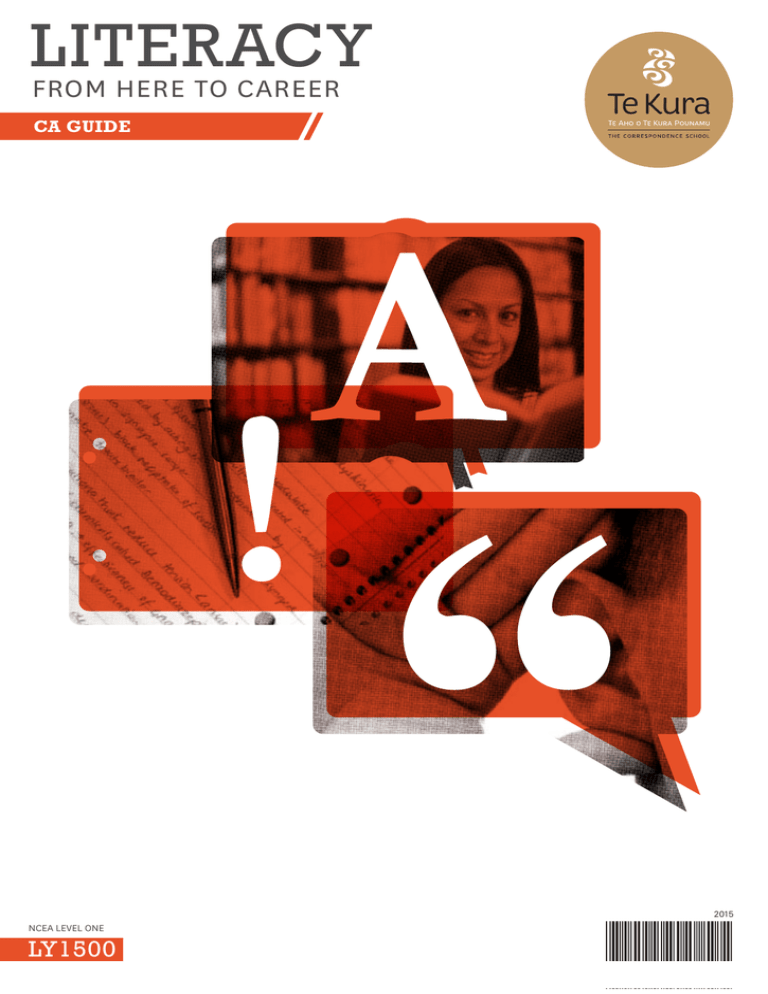
LITERACY
FROM HERE TO CAREER
CA GUIDE
NUMBER
NCEA LEVEL ONE
LY1500
2015
TEACHER CONTACT DETAILS
UNIT STANDARD LITERACY
As soon as you know who your teacher is, please fill out their details below, for future
reference.
TEACHER’S NAME:
TELEPHONE: 0800 65 99 88 EXT:
ALTERNATIVE TELEPHONE NUMBER:
EMAIL ADDRESS:
Private Bag 39992, Wellington Mail Centre, Lower Hutt 5045
Contact your teacher any time you have questions or would like help. They are there to
support you as you work your way through the booklets and tasks in this course. They will
also help you with collecting the samples of work you will need for each assessment.
Copyright © 2012 Board of Trustees of Te Aho o Te Kura Pounamu, Private Bag 39992, Wellington Mail Centre,
Lower Hutt 5045, New Zealand. All rights reserved. No part of this publication may be reproduced or transmitted in
any form or by any means without the written permission of Te Aho o Te Kura Pounamu.
PG 2
LY 1500CA
© TE AHO O TE KURA POUNAMU
CONTENTS
1. Welcome to Level 1 Unit Standard Literacy
2. Unit Standard Literacy outline
3. Assessment information
4. Tracking your evidence as you gather it
5. Getting started information
6. Appendix 1 Examples of evidence
7. Appendix 2
Frequently Asked Questions (for supervisors)
© TE AHO O TE KURA POUNAMU
LY 1500CA
PG 1
1. WELCOME TO LEVEL 1 UNIT STANDARD
LITERACY
The LY1500 modules you are enrolled in give you the opportunity to gather samples from
activities you have completed or taken part in during the course of your everyday life.
From these samples, three will be selected for assessment against one or more of the Level 1
Literacy Unit Standards.
If you are a secondary-aged student, you can only complete these standards as part of
EN1000, the Te Kura NCEA Level 1 English course.
If you are enrolled as an Adult or Young Adult student, you can choose to complete
NCEA Level 1 Literacy through the EN1000 course or just complete the Level 1 Literacy Unit
Standards through Te Kura’s course, LY1500.
Please note that some tasks can be assessed against more than one Literacy Unit Standard, so
make sure you get observations sheets filled in. See the examples in this guide.
To gain Level 1 Literacy, you must achieve either:
• 10 Literacy credits through these three Literacy Unit Standards
or
• 10 Literacy credits through any of the achievement standards that are Literacy-tagged at
www.nzqa.govt.nz/qualifications-standards/qualifications/ncea/subjects/literacy-and
numeracy/level-1-requirements.
You cannot gain Literacy through combining the Literacy unit standards with
achievement standards.
Activities suitable for assessment can occur while you are engaged in your learning
programme, at your workplace, at home with family or when enjoying interests, sports or
hobbies. Often tasks can be used for assessment against more than one standard.
OBSERVATION SHEETS
Observation sheets are included in each of the LY booklets, LY1510 (Reading), LY1520 (Writing)
and LY1530 (Speaking and Listening). It is important to have your observation sheets ready so
a responsible adult can write down the things you are doing that might show the skills we are
looking for. To give yourself the best opportunity to pass on the first assessment, make sure
you send in your observation sheets when you return your samples and cover sheets.
PG 2
LY 1500CA
© TE AHO O TE KURA POUNAMU
EVIDENCE
Consistent participation in your Te Kura courses and regular return of work will give you the
best opportunity to quickly gather the samples which we call evidence.
Your evidence can come from any of your study courses. This includes work you may be
doing with another learning institution at the same time as you are studying with Te Kura.
You can also use work from any of your subjects which you may have had assessed against a
standard that subject offers – whether you passed the standard or not. If you have work you
completed at your previous school or in earlier years as a student with Te Kura, this may also
be considered.
As long as your teacher knows why you did the work or task (the purpose) and who was going
to read or view what you have done (the audience) then any work you have completed can be
considered.
Your teacher has to be sure that you have been using the skill to be assessed consistently over
a period of time. That is, over a period of at least one month.
There is no final assessment task for each standard. Your Te Kura teacher is the person who
completes the assessment. Your teacher can assess your tasks or observed activities as soon
as you have work that meets all the requirements. The sooner you send your work in, the
sooner you will be ready for assessment.
You are expected to keep an eye out for any samples of work.
Your teacher can help you with this but you are the one who knows the activities that are
happening in your world. If you think there is an opportunity to gather the evidence required,
take it. Let your teacher know then decide if the evidence can be used or not.
YOUR FIRST PIECE OF EVIDENCE?
The first task in each booklet is a diagnostic tool to help your teacher decide the
resources to send, to support you as you learn.
Send this in, with the first detachable cover sheet LY1510A, LY1520A or LY1530A, as soon as
you have finished it.
If this work is up to the standard, it may be used as one of your three samples so make
sure you do your best, complete it on your own and sign the back of the cover sheet.
© TE AHO O TE KURA POUNAMU
LY 1500CA
PG 3
COVER SHEETS
Your booklet has a cover sheet on the back.
5 extra cover sheets are found at the back of your booklet.
These are to be used to send in samples when you are not returning the booklet.
You must sign and date each cover sheet you return. If you miss this step, your work will
be delayed.
Your teacher must be sure that the work you send in is your own as it may be used in your
final assessment.
All students are encouraged to submit as much as possible of their work on line via the OTLE
Dropbox. When work requires authentication, students will follow the instructions provided in
OTLE.
TE KURA CODES
LY is the code for Literacy. 1500 indicates that this course is at NCEA Level 1.
LY1510, LY1520 and LY1530 refers to the standard you are completing.
LY1510 Read texts with understanding.
LY1520 Write to communicate for a purpose and audience.
LY1530Actively participate in spoken interactions.
Lots of resources that have different codes, such as ENG or EN have been included, to
support your learning.
If you are unsure about anything you have read here or have further questions, call or email
your Te Kura teacher.
For more information, visit the Literacy and Numeracy for Adults (Te Apariki Ako) website:
www.literacyandnumeracyforadults.com/The-Learning-Progressions
PG 4
LY 1500CA
© TE AHO O TE KURA POUNAMU
LITERACY UNIT STANDARDS: NCEA LEVEL 1
Standard 26622
Write to communicate ideas for a purpose and audience
Internal assessment
4 credits
The requirements for achieving this standard must be met in
each piece of writing selected for assessment.
Standard 26624
Read texts with understanding
Internal assessment
3 credits
The requirements for achieving this standard must be met
across all three samples selected for assessment.
Standard 26625
Actively participate in spoken interactions
Internal assessment
3 credits
The behaviours that demonstrate participation, (such as keeping
the conversation going or showing you are listening by nodding
your head) must be seen by the observer across all three
samples.
Appropriate behaviour, such as polite language, tone and
behaviour, must be seen by the observer in each of the samples
selected.
More detailed information on the requirements for each standard is in the booklets. You can
also visit the National Qualifications (NZQA) (www.nzqa.govt.nz) website.
© TE AHO O TE KURA POUNAMU
LY 1500CA
PG 5
2. UNIT STANDARD LITERACY OUTLINE
Module
name
Title
Unit Standard requirements
Standard
LY1510 M
Read texts with
understanding
Information relevant to reader’s purpose is
located.
Text is described in terms of its ideas and/or
purpose.
Text is evaluated in terms of the reader’s
purpose.
US26624
LY1520 M
Write to
communicate
ideas for
purpose and
audience
Ideas expressed are appropriate to purpose
and audience.
Organisation of ideas is appropriate to
purpose and text type.
Language is appropriate to purpose and
audience.
Technical errors do not detract from the
communication.
US26622
LY1530 M
Actively
participate
in spoken
interaction
Show participation, in the spoken interaction,
through appropriate behaviours.
Show participation, in the spoken interaction,
that is appropriate to the intended purpose
and participants.
US26625
You must pass all 3 standards to gain Unit Standards Literacy.
PG 6
LY 1500CA
© TE AHO O TE KURA POUNAMU
3. ASSESSMENT INFORMATION
STANDARDS
For more information about National Certificates of Educational Achievement and assessment
please refer either to our Student Guide to National Certificates or the Te Kura (www.tekura.
school.nz) and NZQA websites (www.nzqa.govt.nz).
INTERNAL ASSESSMENT
This means the teachers at Te Kura assess your work within the school. You do not have to sit
an external examination for these standards. A Te Kura teacher will be the assessor of your
work.
Your supervisor and anyone who fills in the observation sheet for you, outside Te Kura, is
called an observer.
The observer must be a responsible person (preferably an adult) who can:
• fill in the observation sheet fully for you and
• understands what to do.
Some of the observations will be happening in situations in which people have a short time to
complete the observation sheet. Your goal is to achieve the standard so you want someone
who is confident to do the best job for you.
Assessment for these unit standards is very different from the unit and achievement standards
you may already be familiar with.
© TE AHO O TE KURA POUNAMU
LY 1500CA
PG 7
GATHERING EVIDENCE
• You will collect samples from school work and situations in your everyday life.
Evidence can be collected from:
• school
• workplace
• community
both istockphoto
or from involvement with:
• family
• sports
• leisure (hobbies, interests).
• Your samples must be collected over a period of time so your Te Kura teacher can verify that you have shown you can work consistently at the level required.
This means you can’t sit down and complete all the samples within a week that
you’ve set aside especially for completing this standard.
• Any responsible person can be the observer of your work and verify it is your own.
istockphoto
You may have a part time job in the supermarket
and your manager may be willing to observe you
helping a customer who is learning to use the
self-checkout system.
PG 8
LY 1500CA
© TE AHO O TE KURA POUNAMU
• You can be part of a team of people working to help you complete your unit standard
and you can manage your samples of work to send into your Te Kura teacher.
This is a great place to start showing the
skills you’ve already developed. You can also
practise the skills you’ll need to win the job you
want in the future and to manage other areas
of your life.
istockphoto
This way, you get to take
responsibility – alongside your
supervisor – for picking your
best work. When you’re in a
job or dealing with everyday
skills – like dealing with the
bank because you want your
first home loan – you’ll need
to be taking control and
managing yourself.
• The best way to do this is by organising a folder to keep your collected samples
(evidence) in until it is ready to be forwarded to your Te Kura teacher.
• Samples of work for each of the unit standards in LY1500 can be gathered from any of
your subjects if the sample meets the requirements for one of these 3 unit standards.
It would be a good idea to place
dividers in your folder for LY1510,
LY1520 and LY1530. This will keep your
work for each standard separate.
© TE AHO O TE KURA POUNAMU
If you are able to complete your work
electronically (on a computer) you would
be wise to have 3 folders on your desktop
for LY1510, LY1520 and LY1530 until you are
ready to either send them by email or print
them off to post to your Te Kura teacher.
LY 1500CA
PG 9
• You can keep working on a task you are going to send in to your Te Kura teacher until
you and your supervisor are happy that you will meet the requirements.
• You can make further changes to a task that your teacher has checked before the
assessment takes place.
• You must meet the requirements that are set out for each standard.
One requirement, for example, in US 26624 Read texts with
understanding, is that you show you can find information in a text
that relates to the goal you want to achieve (the purpose) in reading
that text.
For instance, if you are reading a gym fitness circuit guide you will
need to find the instructions for safely completing the new exercises
you will be learning so you don’t injure yourself.
The notes you make, diagrams you draw or discussions you have with
your gym instructor are all examples of the way in which you can
gather your evidence from this activity.
istockphoto
There is information on the observation sheets that will help your
observer understand what they have to do.
• Your Te Kura teacher makes the final decision whether or not you pass the standard.
The three best samples are taken from all of the work selected by you and your supervisor
for assessment. Your teacher will also be able to see if any of the samples can also be used
in assessing either of the other two standards.
• You must send in work which has been verified as your own. This means your observer
must assure us that you were not helped to complete the task.
You can ask questions
about the work along the
way; you just can’t have
someone help you do it.
PG 10
LY 1500CA
© TE AHO O TE KURA POUNAMU
RESUBMISSIONS
If you have not reached the standard once your best three samples have been assessed,
you have the opportunity for resubmission. This means you have the chance to discover and
correct errors you have made or requirements you have not met. A resubmission allows you
another chance to pass the standard.
All resubmissions are to be submitted with a cover sheet your teacher will send to you.
APPEALS
You have the right to question an assessment result. If you are not satisfied, you may appeal.
Refer to the Te Kura Student Guide to National Certificates for more information. You can also
appeal any other decisions, procedures or policies about assessments.
Contact you Te Kura teacher or learning advisor if you wish to appeal. More information and a
form that students can use to appeal are both available on the Te Kura website in the student
toolkit area. Go to www.tekura.school.nz and then go to student toolkit.
© TE AHO O TE KURA POUNAMU
LY 1500CA
PG 11
4. TRACKING YOUR EVIDENCE AS YOU GATHER IT
Planning grid have been included to assist you with tracking your evidence in the variety of
situations in which it might occur.
A chart has also been included so you can record the additional materials and resources
you use and online resources such as websites.
A PLANNING CHART FOR GATHERING EVIDENCE
You can use these two grids to ‘map’ where your evidence comes from. Keep this chart in your
folder for opportunities that arise from your school work in other subject areas, from parttime work, work placement, Authentic Learning opportunities, community, sporting, hobby,
cultural or family involvement.
Remember to also include any Gateway or Star courses you have attended.
PG 12
LY 1500CA
© TE AHO O TE KURA POUNAMU
CURRICULUM
SUBJECT (NAME)
LY1510 WRITING
LY1520 READING
LY1530 SPOKEN
INTERACTION
example:
Topic: Employment rights
Topic: Employment rights
Topic:
Date: 23 February 2012
Date: 23 February 2012
Date:
Topic:
Topic:
Topic:
Date:
Date:
Date:
Topic:
Topic:
Topic:
Date:
Date:
Date:
Topic:
Topic:
Topic:
Date:
Date:
Date:
Topic:
Topic:
Topic:
Date:
Date:
Date:
Topic:
Topic:
Topic:
Date:
Date:
Date:
Legal Studies LG617t1
OTHER OPPORTUNITIES:
e.g.: part-time work, work placement, authentic learning opportunities, community, sporting, hobby, cultural
or family involvement.
example:
SPORT – Saturday rugby
coaching (Pararau
Piranhas)
Topic:
Topic:
Topic:
instructing the under 9 team
Date:
Date:
Topic:
Topic:
Topic:
Date:
Date:
Date:
Topic:
Topic:
Topic:
Date:
Date:
Date:
Topic:
Topic:
Topic:
Date:
Date:
Date:
Topic:
Topic:
Topic:
Date:
Date:
Date:
Topic:
Topic:
Topic:
Date:
Date:
Date:
Date: 24 May 2012
Photocopy for extra copies
© TE AHO O TE KURA POUNAMU
LY 1500CA
PG 13
ADDITIONAL COURSE MATERIALS
ADDITIONAL COURSE MATERIALS/RESOURCES:
Keep a record here of the full webpage address for texts you have read, spoken interactions
you have listened to, etc online.
If you write these in full on your observation sheet for LY1510 Read texts for understanding,
you won’t have to send the text or part of the text you have read to your teacher.
Description
Resources your Te Kura teacher may send you to support the learning in your booklets
Resources you locate yourself (magazine articles, books, manuals etc., in your library/home/
workplace/community)
Your school or local library
www.tec.govt.nz write ‘collections books’ in the search box at the top of the website. (Reading
booklets. High interest topics)
www.google.co.nz and other search engines
PG 14
LY 1500CA
© TE AHO O TE KURA POUNAMU
5. GETTING STARTED INFORMATION
This section is for Adults or Young Adults enrolled in the LY1500 course.
The information may also be useful to you if you are completing the Unit Standard Literacy
modules in the EN1000 or EN1600 course and are new to learning with Te Kura.
ORGANISING YOUR STUDY
Plan a regular time to do your study. It is important to have a plan or a timetable and to stick to it. PLAN FOR ALL THREE STANDARDS
PRESENT EVIDENCE FOR ALL THREE STANDARDS
PASS UNIT STANDARD LITERACY
Some people learn best when they have short, frequent learning sessions. Others do better with
fewer, longer sessions. Contact your Te Kura teacher so you can be supported with the best plan
for ‘study action’ that suits your needs.
Please refer to our Student Guide to Years 11–13 and our website www.tekura.school.nz for more
information to help you study successfully.
TIME COMMITMENT
This will vary according to your method of studying and whether you are in a classroom at
school or working at home.
It will also depend on how much skills development you need to do to prepare for successful
completion of samples for assessment.
The more time and effort you put into completing tasks and gathering evidence, the quicker you
will be ready for assessment of your three best work samples.
You must maintain a steady, consistent commitment as:
• your work samples must be gathered over time
• regular return of work is required for you to stay in the course and on the Te Kura roll.
© TE AHO O TE KURA POUNAMU
LY 1500CA
PG 15
PACE OF LEARNING
Some may enrol in this course at the beginning of the year. From the time you enter the
course, you need to be constantly looking for evidence opportunities in:
• other subject areas
• aspects of your everyday life.
Your pace of learning will be similar to that of a student in school. As a guide, expect to do at
least 5 hours of work per week.
If you have enrolled in LY1500 later in the school year, you can still complete the course by
devoting more time and effort to it.
You can also gather work you have already done in other subjects for consideration in your
final assessment. Your teacher will know the best way to get these samples, for your situation.
RESOURCES YOU WILL NEED TO START
The first booklet you are likely to be sent is LY1510 Reading Texts with understanding.
Your teacher will send out the other booklets, when you are ready for them.
Please let your teacher if you would like to start with the writing or speaking/listening
booklets, or if you are happy to work on all 3 at once.
Contact your teacher if you are at all unsure or do not receive your booklet.
RETURN OF WORK
Your first piece of evidence should be returned to your teacher within the first two weeks of
starting your course.
You are strongly encouraged to submit your work via the OTLE dropboxes.
Talk to you teacher if you have any questions about this option.
Remember, you don’t have to have your own computer to access OTLE. You just have to have
an OTLE password.
The best way to progress with your study is to maintain regular contact with your
teacher. This is easiest to do electronically through OTLE and other electronic means,
even if you are receiving print materials.
PG 16
LY 1500CA
© TE AHO O TE KURA POUNAMU
QUERIES ABOUT YOUR WORK
When you contact your teacher, it is important to have ready:
• your ID number
• your booklet code
• the activity you have a question about.
TO STAY ON TRACK:
• keep regularly checking you’re working towards the requirements of each standard
• work with your supervisor on the tasks you have been set and keep gathering evidence
• send in your workbook, along with any evidence, as soon as it is complete.
If in doubt over anything ALWAYS check with your Te Kura teacher.
Phone, fax or email your teacher if you want to talk about any of this work.
Freephone 0800 65 99 88
© TE AHO O TE KURA POUNAMU
LY 1500CA
PG 17
6. APPENDIX 1
EXAMPLES OF EVIDENCE
EXAMPLES OF EVIDENCE
The following opportunities for gathering evidence have been taken from everyday life
situations that a Te Kura student might experience.
These are examples only. Get an observation sheet filled in if you think a situation might
One of your Te Kura subjects might be Pathway’s
topic PW9004B, Working together.
One of the assessments requires you to have
discussions with members of a group, before
completing your written assessment together.
These may provide you with evidence for both the
writing and speaking/listening standards.
PG 18
LY 1500CA
istockphoto
You have been on maternity leave from a Teen Parent Unit. You are
now ready to go back to the unit and continue your school work.
You have been keeping a journal of your pregnancy and your baby’s
birth and you take this along to show your supervisor. Discuss the
ways you could present evidence for all three standards from this
experience. How will this be done and with whom?
istockphoto
EVIDENCE
EXAMPLE
You’re the leader of your local kapa haka group. You have a plan for
their movement on and off stage at the next performance. You have
to write clear instructions for the group’s next practice and answer
any questions. You then have to read each instruction aloud before
leading them through the plan, step by step.
Can you see how you might use this situation to gather evidence for
all three standards? Ask a responsible person watching and listening
(e.g. parent, the guitarist) to fill in your observation sheets.
EVIDENCE
EXAMPLE
SITUATIONS IN WHICH EVIDENCE MAY BE GATHERED FOR MORE THAN STANDARD
FROM A TASK OR SITUATION:
EVIDENCE
EXAMPLE
A
istockphoto
qualify as evidence for assessment and then send it into your teacher.
© TE AHO O TE KURA POUNAMU
EVIDENCE
EXAMPLE
You are a student enrolled in the following courses at Te Kura:
LY1500
Literacy for Everyday Life
NY1500
Numeracy for Everyday Life
PW9000Pathways
DT1000
Digital Technology
PC1000
Pregnancy and Childcare.
AN EXAMPLE OF EVIDENCE FOR LY1510 READING TEXTS FOR UNDERSTANDING:
You had to complete the Adult Literacy Assessment (ALNAT) on entry
to this course. This may count as evidence.
istockphoto
EVIDENCE
EXAMPLE
B
istockphoto
Tell your Te Kura subject teachers you are enrolled in LY1500
and ask them to help you decide which pieces of your
completed work could be used as evidence for your folder.
You are interested in being a chef and your uncle has a mate, Andre,
who is a chef at a hotel restaurant in another town. You write an email
asking Andre to tell you about his job and what training you would need
to do. Print off your email for evidence.
D
EXAMPLES OF EVIDENCE FOR LY1530 ACTIVELY PARTICIPATE IN SPOKEN INTERACTIONS:
Your liaison teacher comes to visit you (if you are a full-time Te Kura
student) and you discuss together your next learning steps. Your
supervisor could complete an observation sheet of this interaction.
© TE AHO O TE KURA POUNAMU
LY 1500CA
istockphoto
istockphoto
EVIDENCE
EXAMPLE
AN EXAMPLE OF EVIDENCE FOR LY1520 WRITE TO COMMUNICATE FOR A PURPOSE
AND AUDIENCE:
EVIDENCE
EXAMPLE
C
PG 19
EVIDENCE
EXAMPLE
You may be involved with a voluntary organisation such as Riding for
the Disabled. Ask one of the staff to observe you instructing one of the
children to ride.
EVIDENCE
EXAMPLE
You may be a guide or scout leader. Ask another leader or a parent
to complete an observation sheet when they have observed you
instructing the children in how to complete requirements for a badge.
EVIDENCE
EXAMPLE
You have applied for a job in another part of New Zealand. You
have been selected for an interview and the interview will take
place on Skype. You could ask a friend or family member to
support you and to fill in an observation sheet. You could also
ask for feedback on how well you did and write down useful
suggestions for future interviews.
Discuss these activities with your supervisor or a responsible
person to decide if these might be work samples you could send
to your Te Kura teacher.
PG 20
LY 1500CA
istockphoto
EVIDENCE
EXAMPLE
You have a part time job at The Warehouse and have to
answer customer enquiries. Ask your manager to complete
an observation sheet for your customer service interactions.
istockphoto
istockphoto
istockphoto
istockphoto
EVIDENCE
EXAMPLE
You are learning to drive a car and have to talk with your
instructor in order to follow the road rules and drive competently.
Ask your instructor to complete an observation sheet.
© TE AHO O TE KURA POUNAMU
istockphoto
EVIDENCE
EXAMPLE
You may be a lifesaver who has a report to make at the end of the
day you are on patrol or you may have had to assist in a rescue
and have to interact with a member of the public to find out what
happened. Ask another member of your club to complete an
observation sheet for these activities.
EVIDENCE
EXAMPLE
You may have to read a brochure to get some information
while working on one of the NY1500 unit standard
requirements. The way you write your answers to these
questions might meet the requirements of the LY1500 Literacy
writing standard.
You are completing courses at your school as well as by distance
with Te Kura. Ask your subject teachers if there are any pieces of
work you could use for your evidence.
Explain why you need work samples and ask them to help you
decide what work you have completed that could be used for
LY1500. If you asked open questions during your discussion and
kept the interaction going these are skills required for Unit Standard
22625, ‘Actively participate in spoken interactions.’
© TE AHO O TE KURA POUNAMU
LY 1500CA
istockphoto
istockphoto
istockphoto
EVIDENCE
EXAMPLE
You may be planning to attend a First Aid Course with the
Red Cross. The worksheets you complete as you progress
through the course could be used as evidence. The
practical exercises in which you discuss with others how
you would treat a patient might also count.
EVIDENCE
EXAMPLE
This work might also be suitable for assessment in either the
reading or spoken interaction standards.
PG 21
7
APPENDIX 2
FREQUENTLY ASKED QUESTIONS
(FOR SUPERVISORS)
Why does the Te Kura teacher select the 3 pieces that will be assessed?
Te Kura offers the course. The teacher of the course is the assessor. The assessor selects the
final 3 pieces of evidence.
Do we have to get evidence from all the parts of life the student is involved in?
No, the evidence may just come from one area of the student’s life or a range of areas.
This can be school, work, home, sports, hobbies, clubs. The situations listed in the
standards are examples of the range of everyday life situations the student may be involved
in. The student can gather evidence from any of these.
You cannot gather evidence from tests that are specifically designed to assess for these
standards.
Why does evidence have to be gathered over time?
The assessor has to be satisfied that the student has demonstrated competency in the skills
assessed. One assessment does not allow the assessor to see this is a consistent skill the
student has gained.
Is it ok if the student gets a mate to sign the observation sheet?
We recommend that the observer is a responsible person who is both confident and able to
fill out the sheet, fully.
Remind your student that they want to give themselves the best chance to submit a piece of
evidence that will help them pass the standard. This is their goal. The observation sheet is
part of their evidence.
What if the student leaves school and hasn’t finished the course or gained all their standards?
The student has the opportunity, at any time, to enrol in another institution to complete the
standards they have not yet gained. They will not achieve Literacy at NCEA Level 1 until all 3
standards are complete. The student can take their folder of evidence with them. It may have
evidence which is still valid. They will have to check validity on enrolment.
Why have you started the course with US 26624 and not 26622?
Most students have ready access to reading materials around them in their everyday life so
this is an easy standard to start with. Students can start with texts they know and like or texts
that are relevant to everyday life, such as the Road Code for learner drivers.
What happens if we lose any evidence?
Contact your Te Kura teacher straight away. They will discuss with you the next steps from
here.
PG 22
LY 1500CA
© TE AHO O TE KURA POUNAMU
ACKNOWLEDGEMENTS
Photos all from www.iStockphoto.com
Cover
Girl reading, 6637356
Pen and paper, 703969
Hand to ear, 12716675
Photos
Swimming, 2319056
Pregnant girl, 4358631
Māori marae, 4755854
Teenagers sitting on the grass, 10330408
Chef cooking, 7322737
Man practising CPR, 8607149
Girl with school books, 11838462
Little girl on pony, 14546157
Girl in white shirt working, 17046810
Responsible teenage girl, 1371485
At the supermarket checkout, 3261178
Driving lesson, 7636075
Boy with arms folded, 3084750
Rugby player, 15901529
Teenager lifting weights, 4435280
Young girl writing, 6786713
Teacher and student, 8533497
Working together on a problem, 4394529
Outdoor lesson, 3354061
Shop assistant, 12877988
Writing together under a tree, 11001529
© TE AHO O TE KURA POUNAMU
LY 1500CA
PG 23
PG 24
LY 1500CA
© TE AHO O TE KURA POUNAMU

